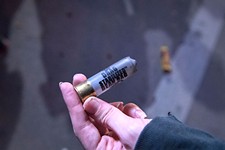Point Austin: The Schroeder File
For APD and Austin, Knee's decision was the right one
By Michael King, Fri., Dec. 9, 2005

"Not only did Officer Schroeder's entire chain of command agree that all the charges should be sustained," wrote Knee in his Nov. 18 termination memorandum to the Civil Service Commission, "they unanimously agreed that indefinite suspension [termination] was the appropriate discipline."
There have been plenty of times at the Chronicle that we've disagreed (or worse) with Knee and the APD brass – indeed, Knee, a favorite of the Statesman editorial board, generally declines to talk to us – but this is not one of those times. I have written here previously (Nov. 4) that based solely on her own admissions, Officer Schroeder is no longer qualified to be an armed police officer, and nothing in the now voluminous APD and Citizen Review Panel Schroeder file persuades me that any other decision is possible. Both the CRP and Knee concluded that Schroeder panicked under pressure and shot Rocha without a reasonable belief that anyone's life was in danger – the only rational or officially permissible reason to use deadly force. Under those circumstances, dismissing Schroeder from the police force is the only way to make certain she will never be in a position to make the same mistake again.
Again, quoting Knee, in the curious language of police dismissals: "While it is never an easy decision to terminate an officer's employment, I believe that it is in the best interests of the Department, the community, and Officer Schroeder, that she be indefinitely suspended."
A Matter for Arbitration
That does not, however, mean Knee's decision will stick. We now enter a very gray period of administrative review, as Schroeder appeals her dismissal to an arbitration hearing (entirely within her rights) that may well end with her reinstatement. She'll be able to point first to a Travis Co. grand jury decision not to bring an indictment in the shooting. But the standards for a criminal indictment are of necessity much higher than any departmental disciplinary decision, including termination. More on point, she and her lawyer can also rely on the APD Internal Affairs investigation that concluded Schroeder did not violate departmental use-of-force policy in shooting Rocha, a conclusion that Knee forcibly rejected in making his termination decision.
Reading through the IA file, it's entirely understandable why Knee wasn't persuaded. The IA investigators based their conclusions on what they say was Schroeder's "reasonable belief" (although a mistaken one) that Rocha might have grabbed her Taser, and may have intended to use it on Doyle, and thereby may have grabbed his gun, and thereupon shot Doyle or her or both. That's the aftermath logic Schroeder gave the investigators, with supportive agreement from Doyle, though it's clear from Doyle's own recounting that he never believed anyone's life was in danger by Rocha and is only concurring in what Schroeder says she believed.
The IA argument is strained and reads that way. Even more tellingly, Schroeder's testimony suggests that she convinced herself of her own deeper reasons for the shooting long after the fact. In the video re-enactment she performed for investigators the day immediately after the shooting, she says nothing of being afraid for her life or even Doyle's. Instead, she recounts only her sudden loss of her (improperly holstered) Taser and her instinctive belief that Rocha must have taken it, and might use it on Doyle. "That's not gonna happen!" she says, reporting that she instantly reached for her gun and fired. By the time she sat for her interview, she had no doubt inserted in her own mind the steps concluding that she must have believed Doyle's life was in danger, the only possible justification for shooting. She no doubt believes that now.
But as Knee's memo explains at length, that was not a reasonable belief at the time; furthermore, in leaping up to shoot Rocha, Schroeder came very close to shooting Doyle as well. That result was far more likely than that the smaller Rocha, clearly determined to flee, would instead decide to overpower both officers with a Taser he didn't know how to use, take one of their guns, and turn on them. Knee points out that Schroeder says she took care to lean sideways, confirm shirt colors, and direct the shot away from Doyle; but if she had time to do all that, she had time to check Rocha's hands for the Taser or, better, use several alternative methods to subdue him. In fact, Doyle may well have remained in the direct path of Schroeder's bullet, according to the forensic evidence. On the same subject, the less restrained CRP report points out, "fortunately for Sgt. Doyle, in a twist of irony, the width of Daniel's skin might have been the only thing that saved Doyle from being shot by his petrified fellow officer."
In addition to the shooting itself, Schroeder was fired (and Doyle was disciplined) for other violations of policy, including improper holstering of the Taser and the utter failure of both to follow the rules on automatic videotaping of such incidents. What the arbitrator may find on all these questions is uncertain, but throughout the file is a running acknowledgment of the embarrassment brought on the APD by what appear to be routine violations of standing policy. (And nobody even mentions the fundamental looniness of this entire penny-ante narcotics stakeout that created the conditions for a phony, melodramatic, and possibly illegal traffic stop that panicked everybody involved and led inexorably to an entirely unnecessary death. That, alas, is a subject for another day.)
Bad Precedent
The legal process is far from complete in the Schroeder case (Sgt. Doyle has accepted his own 28-day suspension), and the politics have barely begun. The Austin Police Association has understandably come to its fellow officer's defense, although the form that defense has taken – attacking Knee as unfit for his office and calling for his dismissal – is, to say the least, unfortunate. (By rights, the APA should logically be calling for the dismissal of all of Schroeder's superior officers, and perhaps that is yet to come.) The APA has every right to dispute Knee's decision, but personalizing the argument and also using it as an unguided weapon against the entire citizen review process will only polarize the community more than the shooting itself has already done.
The CRP is generally to be commended for its overall performance in the Schroeder review, a difficult test case. But that performance was badly undermined by someone's leaking the panel's recommendation to fire Schroeder and demote Doyle (an unjustified overreach) prior to Knee's decision. The APA has filed a grievance over the matter, and its president, Mike Sheffield, has denounced the leak as an attempt to apply public pressure to Knee. Police Monitor Ashton Cumberbatch counters reasonably that the leak could just as easily have been an attempt to undermine the CRP's decision, and an independent investigation is under way. "If anyone in my office had anything to do with it," Cumberbatch told me, "they know they're fired." He also insists the leak does not undermine the justice of the panel's recommendation.
In the wake of Knee's decision, the cop rumor mill is on overdrive, with some loudly bruiting their belief that City Manager Toby Futrell improperly put direct pressure on a reluctant Knee to fire Schroeder. Knee's thorough and careful memorandum – which may yet get shot down in arbitration – argues very much otherwise. Although Futrell has publicly supported the chief's decision, my own (admittedly dithering) sources over at City Hall do not confirm any direct interference. Should it appear to the arbitrator that there was any outside (especially political) interference in an APD personnel decision, he or she could find a violation of due process. (For the record, although the Statesman has been loudly demanding the City Council throw more of its weight publicly behind Knee, the city charter explicitly prohibits council members from involvement in personnel matters – especially foolhardy when they have not been finally resolved.)
More likely to cause a problem for Knee at arbitration is APD's notoriously inconsistent disciplinary precedent. Most specifically, Knee is likely to have a very hard time explaining why Schroeder should be dismissed now, when in 2003 he did not fire Officer Scott Glasgow for shooting Jesse Lee Owens. The Owens shooting took place in circumstances quite similar to the Rocha shooting, and involved some of the same and arguably some much more egregious violations of APD policy. The CRP also recommended Glasgow's firing; Knee instead decided a 90-day suspension was sufficient. I frankly don't know how Knee will argue his way out of that one. But if he can't do so, not just the APD, but the whole city, will be the worse for it.
For the moment, the Schroeder decision, unhappy as it is, stands as Chief Stan Knee's finest moment, as well as a reflection of the Office of the Police Monitor and the Citizen Review Panel's maturation. Both the APD administration and the OPM/CRP could use a good bit of judicious tinkering. But we have reason to be proud that in this case at least, our city's police discipline and its monitoring process worked well – both for a better police force and a more just community. ![]()
Got something to say on the subject? Send a letter to the editor.










